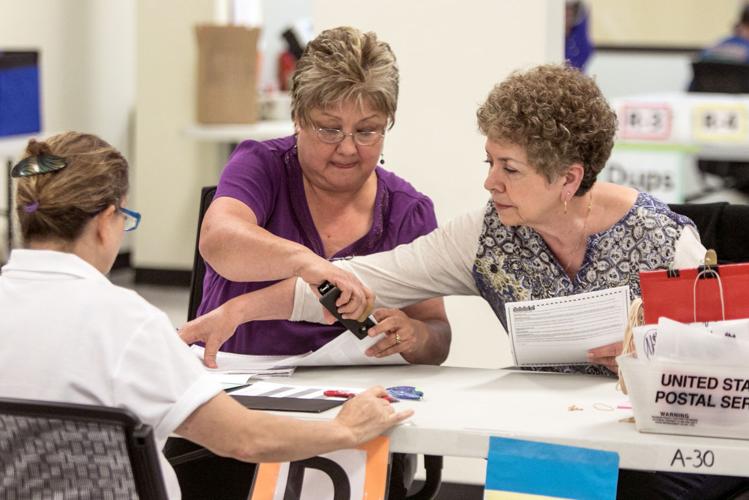On Monday, a Pima County judge struck one little blow against Donald Trump’s argument that the general election will be “rigged.”
Superior Court Judge Richard Gordon ordered Pima County to preserve not just the ballots that we cast but also the scanned images of the ballots that the county’s computers actually use to tally votes.
Gordon made the ruling in a public-records case brought by an election-integrity group, Audit-AZ, requesting that the ballot images be declared public records. He said they are.
That, said election-integrity gadfly John Brakey, will allow outsiders to be able to audit election results on their own, optimizing the abilities of Pima County’s new election systems.
“It’s a great system. It’s transparent, it’s trackable,” Brakey said.
Of course, the idea that we in Pima County will be able to count digital ballots on our own, if we choose, will not reassure some people that there isn’t a nationwide problem with election fraud.
Trump has energized that idea this week in his tweets and his public comments.
On Monday morning he wrote: “Of course there is large scale voter fraud happening on and before election day. Why do Republican leaders deny what is going on? So naive!”
And in Wisconsin he said, “They even want to try to rig the election at the polling place. So many cities are corrupt and voter fraud is very, very common.”
It seems obvious that Trump is saying this to try to explain his likely loss as illegitimate. As many people have said, that’s playing with fire: Our country’s elections have long been trusted, and undermining them like this is likely to unleash dangerous passions on the part of those who think they were cheated.
But it would be wrong to look at this as strictly an issue of elections.
The chair of the Pima County GOP, Bill Beard, pointed out to me that this concern about election fraud is part of a broader anger about society itself being “rigged.” Both Trump and Bernie Sanders, who spoke in Tucson on Tuesday night, built their campaigns on the righteous anger of supporters who feel systems are rigged against them.
People see that the financiers who unleashed the Great Recession never were prosecuted, that the rich have gotten richer for decades while the rest of us have barely hung on, that Hillary Clinton wasn’t prosecuted for email practices that may have landed someone else in court, that the Democratic National Committee worked to help Clinton beat Sanders. They conclude the whole big societal system is rigged.
And to some extent that’s true. The rich and powerful often get away with things that others don’t.
So if all those things are rigged, no wonder people would think the elections are rigged, too.
And yet, that’s a lazy conclusion. Because if you know anything about the election system, you know it is complex, localized, and replete with checks and balances. Not infallible, but stronger than you might think.
Matt Roberts of the Arizona Secretary of State’s Office noted that the vote tabulation system itself is not connected to the internet. Outsiders can’t hack into it as they tried to with the voter registration system.
The voting equipment is also tested for “logic and accuracy” before each election, Roberts noted.
“We require the counties to provide us a random sample of their election equipment,” he said. “We have them program a test mock election. We vote a sampling of ballots. If the vote doesn’t match the pre-determined vote exactly, we will not certify that equipment, and they’ll have to find out what occurred.”
F. Ann Rodriguez, Pima County’s longtime recorder and a Democrat, also took umbrage at the critique that the election itself is somehow “rigged.”
“We check every signature on a ballot that comes in. At polling places, you show an ID. We have a lot of checks and balances in the system,” she said.
At the elections center “we’re under party observation,” she noted. “The political parties are there. They’re watching our signature processing. When we do tabulations, we have cameras in there.”
The Arizona Republic talked this week with former governor and secretary of state Jan Brewer, a Republican who is actively supporting Trump.
Even Brewer contradicted her candidate’s claim, saying, “I don’t think there’s a lot of fraud going on.”
But there have been occasional instances of fraud, noted Beard, the Pima GOP chair. And this week, the conservative provocateur James O’Keefe put out a new undercover video allegedly showing Democrats willing to engage in voter fraud. Overall, it’s not a convincing video, but it will sow more doubt.
So when you put together a few instances of actual fraud, a candidate willing to undermine our system rather than be seen to lose legitimately, and a real sense of society feeling “rigged,” no wonder some are willing to go along with Trump’s claim that the whole thing is a sham.
It’s dangerous, of course. But it’s also curable. Beard noted that the parties always need volunteers willing to observe elections, vote tabulation, signature checks and other procedures.
“If you sit on the sidelines, you’re contributing to the mistrust and your lack of faith in it being a fair process,” he said.
And with this new court ruling, we should eventually be able to count the ballots ourselves. That’s pretty transparent.





